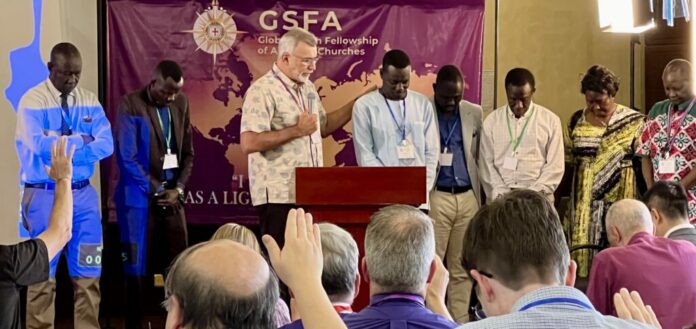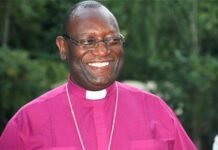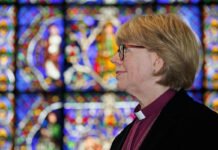Anglicans from across the Global South are seeking to take on a wider leadership role within the worldwide Anglican Communion of which their churches increasingly represent an overwhelming share.
Forty countries are representated at the Global South Fellowship of Anglicans (GSFA) first Assembly meeting June 11-15 outside of Cairo, Egypt.
The membership of GSFA significantly overlaps with another Anglican renewal group, the Global Anglican Future Conference (GAFCON), but each has a different, complementary area of focus.
GAFCON, which launched in 2008, seeks to address an evangelistic or missional deficit within the Anglican Communion, while GSFA, first convened in 1994 as a geographic fellowship, seeks to fill an ecclesial deficit. The former has stepped in to inaugurate orthodox Anglican expressions in geographic areas where the official Anglican Communion structures are perceived to be compromised. The latter chiefly (though not exclusively) works among existing, broadly recognized Anglican provinces, and began the process of recasting itself as a covenantal, rather than an exclusively geographic structure in 2016.
Both entities proclaim creedal orthodoxy and warn against “bowing to the demands of revisionism” that have increasingly characterized churches in the Global North, in the words of GSFA Chairman and Archbishop of South Sudan Justin Badi Arama.
In one sense, the GSFA gathering is not seeking to launch something wholly new, but rather to renew or to recognize renewal already underway as a “holy remnant” in the Communion. As Global South churches have numerically grown, they are ready to assume leadership responsibility and to work with one another without going through the historic See of Canterbury and the existing Communion-wide institutions, known as the “Instruments of Communion.”
Additional bodies unrepresented within official Anglican Communion structures are also here: the Anglican Church in North America (ACNA), formed in 2009 at the direction of GAFCON, the Anglican Church in Brazil, and “extra-provincial” dioceses including the Church of Confessing Anglicans in New Zealand and the Diocese of the Southern Cross in Australia. Each has been recognized by GSFA as either a full (“ordinary”) or associate member. Mission partners, including missionary sending organizations, can also apply for and receive a recognized status within the GSFA.
”The creation of the membership category of Mission Partner is a huge encouragement to me, and I believe it will be a key component in helping biblically faithful global Anglicans in actively engaging in fulfilling the Great Commission together,” New Wineskins Missionary Network Executive Director Jenny Noyes told me. “We must keep our focus on reaching the 2+ billion people who still have no access to the good news of Jesus Christ.”
Bishop Jay Behan of the Church of Confessing Anglicans in New Zealand is grateful for the relationships and missional vitality he’s found in GAFCON but hopes that GSFA will offer something additional.
“GAFCON is a movement,” Behan shared with me. “GSFA is a structure.” And, in Anglican ecclesiology, structure matters.
The component members of GSFA and GAFCON also vary: Nigeria and Rwanda are heavily involved in GAFCON, but only lightly represented, or not at all, at GSFA, as their provinces have not initiated the process of joining the GSFA covenantal structure (though they were invited to participate as observers at GSFA Assembly). GSFA observers are in addition to the ordinary and associate members, including participants from nations including Cameroon, Burundi and Angola.
A delegation from the Chinese Christian Council, the registered Protestant body in China, offered greetings. The Chinese observers’ enthusiastic reception on stage raised some eyebrows as they relayed Chinese President Xi Jinping’s words about the “sinicization of faith” that has been seen as euphamism for mandating Communist Party teachings within the life of the churches.
“There are some snakes in the tent,” one bishop remarked to me in conversation. “Not many, but there are some.”
Anglican Communion Secretary General Anthony Poggo was welcomed here, an appearance that would be less likely at GAFCON.
Poggo’s appearance comes as two potentially dissonant messages are conveyed by GSFA officials here in Egypt. One is commitment to the historic Communion, with Archbishop Badi stating in his opening address that “we respect and relate to the seat of St. Augustin. It is always our prayer that the person who sits on that seat will always be faithful to the faith we once received from the Saints and faithfully transmitted.”
Simultaneously, Badi noted that even as Canterbury says, “let us walk together, listen to each other and have a good disagreement,” the GSFA Primates (first bishops in Anglican parlance) say “we cannot walk together in sin … unless there is repentance by those who have gone astray, we cannot have unity at the expense of God’s life-giving truth.” Badi also observed that previous Global South and Communion-wide statements have “never been taken seriously by revisionist Provinces.”
The sentiment was echoed by Archbishop of Kenya Jackson Ole Sapit, who remarked that conversations disputing the obvious are unproductive.
“Grass can never be blue, chicks cannot be cubs, but we’ve been arguing over that which is plainly true,” Sapit determined. Instead, he advised fellow Anglicans in the Global South to not argue with “empty words and talk” but instead preach and teach the Word of God.
In short, Global South Anglicans articulate that they want historic structures, but not at the expense of faithfulness to scripture. Decades of dialogue have not resolved intractable conflict, but instead exposed a widening gulf between revisionism and proclamation of an authentic gospel truth.
The Anglican Communion sometimes functions with a lack of integration or “multiple personalities,” warned conference host and Archbishop of Alexandria Samy Shehata. “Your identity reflects your relationship with God and others.”
The GSFA will seek to address that with a covenantal structure between member provinces as well as elections this week by bishops, clergy and laity to hold office within its new structure. But the core of what is taking place is an effort to be faithful to hold fast to God’s word as “the faith once delivered” (Jude 3) and seek to obey it.
“We cannot have unity at the expense of God’s life-giving truth,” Badi summarized.




[…] Source link […]
[…] Source link […]